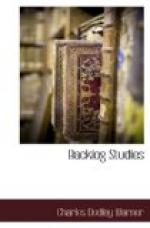The fire-tender. Oh, a good character in fiction is an inspiration. We admit this in poetry. It is as true of such creations as Colonel Newcome, and Ethel, and Beatrix Esmond. There is no patchwork about them.
The young lady. Why was n’t Thackeray ever inspired to create a noble woman?
The fire-tender. That is the standing conundrum with all the women. They will not accept Ethel Newcome even. Perhaps we shall have to admit that Thackeray was a writer for men.
Herbert. Scott and the rest had drawn so many perfect women that Thackeray thought it was time for a real one.
The mistress. That’s ill-natured. Thackeray did, however, make ladies. If he had depicted, with his searching pen, any of us just as we are, I doubt if we should have liked it much.
Mandeville. That’s just it. Thackeray never pretended to make ideals, and if the best novel is an idealization of human nature, then he was not the best novelist. When I was crossing the Channel—
The mistress. Oh dear, if we are to go to sea again, Mandeville, I move we have in the nuts and apples, and talk about our friends.
III
There is this advantage in getting back to a wood-fire on the hearth, that you return to a kind of simplicity; you can scarcely imagine any one being stiffly conventional in front of it. It thaws out formality, and puts the company who sit around it into easy attitudes of mind and body,—lounging attitudes,—Herbert said.
And this brought up the subject of culture in America, especially as to manner. The backlog period having passed, we are beginning to have in society people of the cultured manner, as it is called, or polished bearing, in which the polish is the most noticeable thing about the man. Not the courtliness, the easy simplicity of the old-school gentleman, in whose presence the milkmaid was as much at her ease as the countess, but something far finer than this. These are the people of unruffled demeanor, who never forget it for a moment, and never let you forget it. Their presence is a constant rebuke to society. They are never “jolly;” their laugh is never anything more than a well-bred smile; they are never betrayed into any enthusiasm. Enthusiasm is a sign of inexperience, of ignorance, of want of culture. They never lose themselves in any cause; they never heartily praise any man or woman or book; they are superior to all tides of feeling and all outbursts of passion. They are not even shocked at vulgarity. They are simply indifferent. They are calm, visibly calm, painfully calm; and it is not the eternal, majestic calmness of the Sphinx either, but a rigid, self-conscious repression. You would like to put a bent pin in their chair when they are about calmly to sit down.




